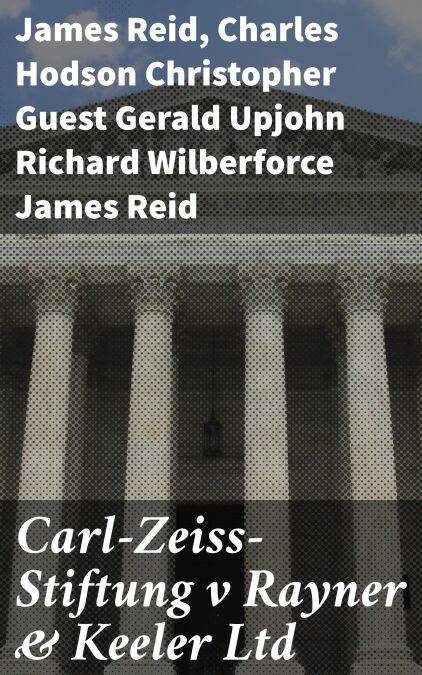
Bedankt voor het vertrouwen het afgelopen jaar! Om jou te bedanken bieden we GRATIS verzending (in België) aan op alles gedurende de hele maand januari.
- Afhalen na 1 uur in een winkel met voorraad
- In januari gratis thuislevering in België
- Ruim aanbod met 7 miljoen producten
Bedankt voor het vertrouwen het afgelopen jaar! Om jou te bedanken bieden we GRATIS verzending (in België) aan op alles gedurende de hele maand januari.
- Afhalen na 1 uur in een winkel met voorraad
- In januari gratis thuislevering in België
- Ruim aanbod met 7 miljoen producten
Zoeken
Carl-Zeiss-Stiftung v Rayner & Keeler Ltd E-BOOK
Unraveling Legal and Ethical Dilemmas in Post-War Intellectual Property Rights
James Reid, Charles Hodson Christopher Guest Gerald Upjohn Richard Wilberfor
E-book | Engels
€ 1,99
+ 1 punten
Omschrijving
Carl-Zeiss-Stiftung v Rayner & Keeler Ltd' stands as a seminal anthology that unravels the intricate tapestry of legal, ethical, and commercial dilemmas intertwined with intellectual property rights in the post-war era. This collection, through a diverse array of judicial opinions, scholarly essays, and critical responses, captures the essence and complexity of the landmark case, presenting readers with a rich mosaic of perspectives that challenge and engage. The anthology is notable not only for its comprehensive examination of the case itself but also for its exploration of the broader implications for international patent law and practice, highlighting pivotal moments and key arguments that have shaped the legal landscape. The contributing authors, James Reid, Charles Hodson, Christopher Guest, Gerald Upjohn, and Richard Wilberforce, bring a wealth of experience and insight, having been integrally involved in the fabric of legal scholarship and judicial activism. Their collective expertise represents a spectrum of legal thought that adds depth and nuance to the discussion of intellectual property rights, ultimately showcasing the dynamic interplay between law, innovation, and policy. This anthology is not merely a recounting of a historic legal battle but an invitation to delve deeper into the complexities of legal principles and their application in a rapidly evolving world. It appeals to legal scholars, practitioners, and anyone interested in the intersections of law, technology, and society, offering a comprehensive and incisive exploration of a case that continues to resonate within the corridors of justice and beyond.
Specificaties
Betrokkenen
- Auteur(s):
- Uitgeverij:
Inhoud
- Aantal bladzijden:
- 103
- Taal:
- Engels
Eigenschappen
- Productcode (EAN):
- 4064066437213
- Verschijningsdatum:
- 7/12/2020
- Uitvoering:
- E-book
- Beveiligd met:
- Digital watermarking
- Formaat:
- ePub

Alleen bij Standaard Boekhandel
+ 1 punten op je klantenkaart van Standaard Boekhandel
Beoordelingen
We publiceren alleen reviews die voldoen aan de voorwaarden voor reviews. Bekijk onze voorwaarden voor reviews.









